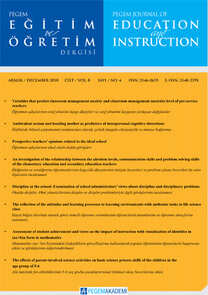The Effect of Digital Literacy Towards The Selection of Social Science Teacher Learning Media
Selection of the proper media is one of the teacher’s duties in teaching. It must be followed by several aspects, one of which is teacher’s ability in digital literacy to keep up with the developments of today’s all-digital era. The study aimed to examine the effects of digital literacy levels on the selection of learning media for social science teachers. In the study, correlational quantitative method was used, with data collection applying questionnaires and document studies. The participants of the study were 22 social science teachers from 11 junior high schools selected via total sampling method. The obtained data were analyzed using simple linear regression. The results revealed that there was a significant effect between digital literacy on the selection of social science teacher learning media. The result of the regression equation is Y = 0.553 + 0.119X. Meanwhile, the result of hypothesis testing from the T-Test and F-Test showed that Ho was rejected and Ha was accepted
___
Adam Steffi, & Syastra Taufik. (2015). Pemanfaatan Media Pembelajaran Berbasis Teknologi Informasi Bagi Siswa Kelas X SMA Ananda Batam. CBIS Journal. 3 (2), 78-90Al Khazaleh, S. (2021). The effect of digital reading on EFL learners’ reading comprehension. International Journal of Education, Technology and Science, 1(1), 59-70.
Arsyad Azhar. (2017). Media Pembelajaran edisi revisi. Jakarta : Rajawali Pers.
Badan Pusat Statistika. (2020). Kecamatan Ajibarang Dalam Angka Tahun 2020. Retrieved from www.banyumaskab.bps.go.id on 10 June 2021.
Dinas Pendidikan Kabupaten Banyumas. (2015). Data pokok Pendidikan Kabupaten Banyumas. Retrieved from http:// dapodik.banyumaskab.go.id/pencarian.php?sw=1 on 12 January 2021.
Gilster Paul. (1997). Digital Literacy. USA: Wiley Computer Publishing
Hasanah, U. U., & Setiaji, K. (2019). Pengaruh Literasi Digital, Efikasi Diri, Lingkungan Terhadap Intensi Berwirausaha Mahasiswa Dalam E-Business. Economic Education Analysis Journal, 8(3), 1198-1215.
Kemendikbud. (2017). Panduan Gerakan Literasi Nasional. Jakarta Timur
Mewangi, A. B. dkk. (2020). Pengaruh Literasi Digital Terhadap Keterampilan Sosial Dalam Pembelajaran IPS pada Peserta Didik Kelas IX SMP Islam Al Azhar 29 Semarang. journal. unnes.ac.id. 5(1), 40-46.
Mısır, H. (2018). Digital literacies and interactive multimedia- en ha nced tools for la ngage teachi ng a nd lea rni ng. International Online Journal of Education and Teaching, 5(3), 514-523.
Rohani, R. (2019). Media pembelajaran. Diktat Kuliah UINSU. repository.uinsu.ac.id
Susilo, H. (2019). Pegaruh literasi digital dan literasi informasi keislaman terhadap hasil belajar afektif pendidikan agama Islam peserta didik SMA N 1 Kendal (Doctoral dissertation, UIN Walisongo).
Ulandari, D. N. (2018). Pengaruh Literasi Digital terhadap Perilaku Plagiarisme pada Mahasiswa (Doctoral dissertation, Universitas Muhammadiyah Jember).
Yuniani Arnelia, Ardianty D. I., Rahmadani W. A. (2019). Era Revolusi Industri 4.0: Peran Media Sosial Dalam Proses Pembelajaran Fisika di SMA. Gravitasi, 2(1), 18-24.
- ISSN: 2146-0655
- Başlangıç: 2011
- Yayıncı: Pegem Akademi Yayıncılık Eğitim Danışmanlık Hizmetleri Tic. Ltd. Şti.
Sayıdaki Diğer Makaleler
The Effects of Differentiated Science Teaching According to the Grid Model
Quality Improvement Model of History Education at University
Suwito Eko PRAMONO, Heriyanto, Inaya Sari MELATİ
Bakr Bagash Mansour Ahmed AL-SOFİ
Development and implementation of mathematics attitudes scale for the primary and secondary students
Mehmet GÜLBURNU, Kenan YILDIRIM
Hanifah MAHAT, Saiyidatina B. NORKHAİDİ, Mohmadisa HASHİM, Nasir NAYAN, Yazid SALEH, Nurul H. L. ABDULLAH, Nur Hidayah BAHARUDİN, Nurakma JAMHARİ
Development of an instrument of assertive communication scale based on Yogyakarta Cultural Value
Andi Mappiare, M.Ramli, Ahmad Taufiq, Nur Hidayah, Sunaryono, Muya Barida
